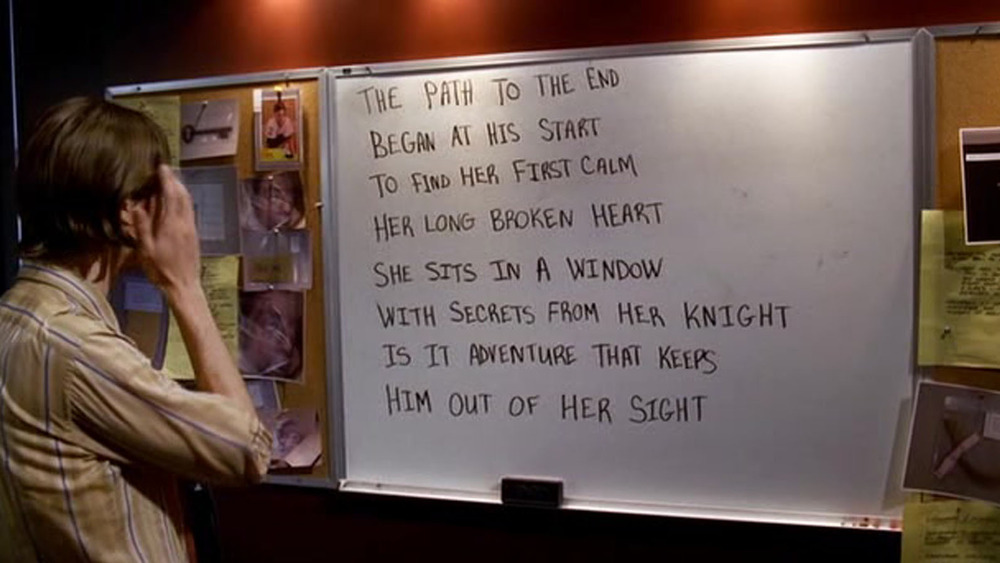The Truth About What Criminal Minds Gets Wrong About Profiling
It's rare for a movie or a TV series to depict a real-life profession with 100 percent factual accuracy. Sometimes, realism isn't the point. Liar, Liar is a Jim Carrey vehicle, not a documentary about the legal profession. Other times, filmmakers make deliberate choices to try and make a profession more visually interesting. Hackers might be entertaining, but it's also a wildly inaccurate representation of computer hacking.
Truth be told, movies and TV are often responsible for the public's misconceptions about certain professions, which only makes it more difficult for people in those fields to do those jobs. One of the most famous examples is the "CSI effect," which some prosecutors say is responsible for skewing the way juries make decisions. This leads us to the show Criminal Minds, which aired more than 300 episodes from 2005 to 2020. It was a hit, but it also wasn't a very accurate depiction of criminal profiling.
Recently, Looper spoke with Dr. John Paul Garrison, PsyD, MBA, C-PD, a clinical and forensic psychologist as well as a certified personality disorder expert. Dr. Garrison discussed some of the ways that Criminal Minds got criminal profiling wrong.
Handwriting analysis
Criminal Minds makes handwriting analysis out to be way more powerful of a tool than it really is. On the episode "Last Word" from the show's second season, Dr. Reid (Matthew Gray Gubler) uses a suspect's handwriting to diagnose their emotional state. According to Reid, the shapes of individual letters are indicative of a person's personality.
While handwriting analysis has been used to identify criminals — it was used to help catch BTK killer Dennis Rader, for example — it's not a personality test. "The gold standard for evidence-based assessment is whether or not results and relevant interpretations would hold up in a court of law," Dr. Garrison told Looper. "Empirical assessments, such as IQ tests, hold up very well and have a rich, consistent body of research that proves these tests are reliable and valid."
Handwriting analysis of this kind is considered a "projective test" rather than an assessment backed up by evidence. According to Dr. Garrison, "Projective tests, such as the Rorschach, often do not perform well under the scrutiny of a sharp attorney and have far less rigorous empirical research to prove their validity."
Instead, the best way to use handwriting to determine someone's emotional state is to analyze the actual content of their writing, rather than the writing itself.
The idea that taking too long to read something is suspicious
In the sixth episode from the seventh season, "Epilogue," Dr. Reid observes a suspect who's taking longer than usual to read a page in a magazine. It usually takes them 11 minutes and 17 seconds to turn a page (Yes, Dr. Reid timed them), but this time it's taking 16 minutes and 24 seconds. Dr. Reid concludes something must be wrong. Conveniently, Dr. Reid never bothers to mention exactly what is wrong, or where he got this idea to time the suspect's reading in the first place.
"A profiler doing this is pure fantasy," Dr. Garrison told Looper. "One might observe that a suspect spent a bit longer reading a particular article or examine their unconscious emotional reaction, but the precise times are essentially meaningless. If you cannot reasonably explain to a jury why 11 minutes and 17 seconds to read an article has any specific scientific reasoning backed by research, it is not especially useful as evidence of anything."
Criminal profiling
In season 3's "Lo-Fi," Prentiss (Paget Brewster) and Cooper (Erik Palladino) are going undercover. When Cooper describes criminal profiling as "fortune telling," Prentiss gives him a demonstration of what profiling actually is. According to Prentiss, it's just noticing behavior. Prentiss rattles off several things she observed about Cooper's personality, which all tell her that he's loyal, ex-military, and respects the chain of command.
According to Dr. Garrison, this part of the scene is accurate. It's true that criminal profiling is based on "noticing behavior," especially body language. When Prentiss concludes that Cooper instinctively protects his badge when he feels disrespected, that's a valid interpretation.
But then Prentiss takes it a step too far. Based on the fact that he has two different pen marks his left hand that he has a toddler who's learning to draw. Also, she concludes that Cooper is devoted to his wife even though he's flirty and doesn't wear his wedding ring.
Dr. Garrison described this as a Sherlock Holmes-esque interpretation that's not based on Cooper's actual behavior. "All of that is beyond anyone trying to use a scientific approach to profiling. Interpretation about a behavior often comes from experience and knowledge. She has far too little data to make such strong and specific assertions," he told Looper.
Terminology
In a briefing scene during season 6's "Sense Memory," Reid, Hotchner (Thomas Gibson), and Rossi (Joe Mantegna) give the LAPD a preliminary profile of the week's unsub. They predict that the suspect is the operator of an unlicensed taxi. They speculate that he's a psychopath with extremely above average intelligence — which they add is a common trait among "true psychopaths." Finally, they describe him as "antisocial" even though his job involves interacting with the public.
Dr. Garrison pointed out several inaccuracies here. First off is the idea that true psychopaths are highly intelligent. In reality, research has shown that the opposite is true.
But the bigger issue is the use of the word "antisocial." Laypeople use "antisocial" to mean "someone who does not like to be social." But in a clinical context, "antisocial" is used to describe a psychopath. "It is someone antagonistic to society or social norms," Dr. Garrison told Looper. "It is someone whose behavior is destructive towards social norms."
The suspect probably is antisocial in a clinical sense, but in this context, a criminal profile would have described their behavior as "not social" instead of "antisocial." And according to Dr. Garrison, a real psychological investigator would never get that wrong.




